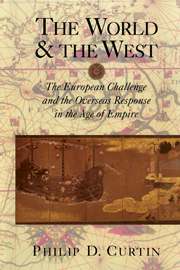Book contents
- Frontmatter
- Contents
- Preface
- Part One Conquest
- Part Two Culture Change and Imperial Rule
- 4 Culture Change in Plural Societies: South Africa and Central Asia
- 5 Culture Change in Mexico
- 6 Administrative Choices and Their Consequences: Examples from Bengal, Central Asia, Java, and Malaya
- Part Three Conversion
- Part Four Independence and the Liquidation of Empires
- Index
6 - Administrative Choices and Their Consequences: Examples from Bengal, Central Asia, Java, and Malaya
Published online by Cambridge University Press: 05 June 2012
- Frontmatter
- Contents
- Preface
- Part One Conquest
- Part Two Culture Change and Imperial Rule
- 4 Culture Change in Plural Societies: South Africa and Central Asia
- 5 Culture Change in Mexico
- 6 Administrative Choices and Their Consequences: Examples from Bengal, Central Asia, Java, and Malaya
- Part Three Conversion
- Part Four Independence and the Liquidation of Empires
- Index
Summary
Government administration has been a long-standing concern with those who have managed European empires overseas, as it was for those trying to govern Europe itself in the industrial age. It was one thing to decide what policies to follow, and quite another to see that they were carried out on the ground. This involved the same sort of management techniques that were so important to the rise of the West in many different fields. Political and diplomatic history attract more attention than administrative history; they have the excitement of a game with winners and losers and clever moves by the players. Administrative history, on the other hand, is concerned with the way political decisions are carried out, which is often more important than the decisions themselves. The efficiency of government depends on the machinery for transmitting whatever orders come from the ruling group down through lower ranks of society until the lower orders are finally forced to do something or to refrain from doing something.
It is increasingly clear that government administration is properly a part of the technology of management, and the rise of administrative competence in Europe itself was long and gradual. In the Middle Ages, many of the powers associated with maintaining peace and order and directing the course of society were in the private hands of feudal lords. The pages of Western Civilization textbooks describe a succession of government authorities who sought, among other things, to create a centrally controlled and effective bureaucracy.
- Type
- Chapter
- Information
- The World and the WestThe European Challenge and the Overseas Response in the Age of Empire, pp. 92 - 108Publisher: Cambridge University PressPrint publication year: 2000



